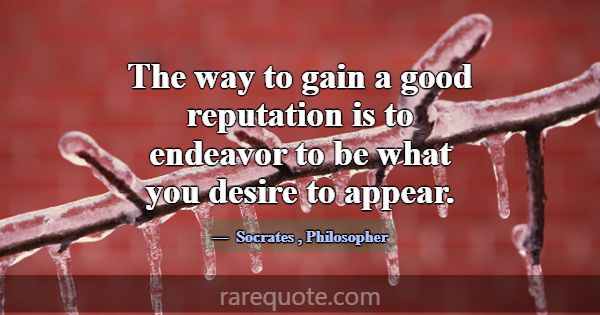Good Quotes - Page 29
This quote suggests that feeling a righteous anger or indignation can serve as a catalyst for channeling one's abilities, strengths, and capabilities. It implies that a sense of moral outrage or righteous anger can motivate individuals to unleash their full potential and take action. It underscores the idea that experiencing a justified indignation can fuel determination and bring forth one's latent powers or abilities.
This quote humorously reflects the desire for immediate gratification or quick results. It suggests that people often prioritize timeliness or convenience over the quality of the outcome. It implies that individuals may prioritize efficiency or meeting deadlines over achieving the highest level of excellence. It underscores the idea of the tension between quality and expediency in certain situations.

This quote suggests that building a positive reputation involves aligning one's actions and behavior with the image or qualities one wishes to project. It emphasizes the importance of consistency between one's desired reputation and personal conduct.
This quote posits that life itself is not inherently characterized as either good or evil but serves as a context or platform in which both good and evil can exist or manifest. It suggests that individuals and their choices determine the presence of good or evil within life.
This quote expresses the speaker's willingness to face significant dangers or challenges in order to achieve a favorable reputation or earn a good name in the city of Athens.
This quote highlights the significance and impact of receiving positive recognition or praise. It humorously suggests that a sincere compliment can have a lasting effect on one's well-being and motivation. It implies that acknowledgment and validation from others can be highly rewarding and uplifting. It underscores the idea of the power of positive affirmation.
This quote employs a metaphorical comparison between a beehive and individual bees to convey the interdependence of a collective community or society. It implies that actions or decisions that harm the community as a whole will ultimately have negative consequences for individuals within that community.
This quote asserts that every individual possesses the capacity to make choices between good and evil. It suggests that moral agency and the ability to distinguish right from wrong are inherent in all human beings, emphasizing the universal potential for individuals to make ethical decisions and contribute to positive outcomes. It emphasizes the significance of individual responsibility and the power of personal choice in shaping one's actions and impact on the world.
This quote humorously acknowledges the value of silence when faced with a challenging question or when unable to provide a satisfactory response. It suggests that remaining silent can be preferable to offering an inadequate or ill-considered answer. It implies that in certain situations, refraining from speaking can be a wise choice, preserving one's credibility or avoiding unnecessary embarrassment.

This quote implies that as individuals grow older and gain wisdom through life experiences, they become more inclined to provide good advice to others. It suggests that by the time someone reaches old age, they have learned from their past mistakes and can guide others effectively.
Popular Topic
- Age
- Alone
- Amazing
- Anger
- Anniversary
- Architecture
- Art
- Attitude
- Beauty
- Best
- Birthday
- Brainy
- Business
- Car
- Chance
- Change
- Christmas
- Communication
- Computers
- Cool
- Courage
- Dad
- Dating
- Death
- Design
- Diet
- Dreams
- Easter
- Education
- Environmental
- Equality
- Experience
- Failure
- Faith
- Family
- Famous
- Father's Day
- Fear
- Finance
- Fitness
- Food
- Forgiveness
- Freedom
- Friendship
- Funny
- Future
- Gardening
- God
- Good
- Government
- Graduation
- Great
- Happiness
- Health
- History
- Home
- Hope
- Humor
- Imagination
- Independence
- Inspirational
- Intelligence
- Jealousy
- Knowledge
- Leadership
- Learning
- Legal
- Life
- Love
- Marriage
- Medical
- Memorial Day
- Men
- Mom
- Money
- Morning
- Mother's Day
- Motivational
- Movies
- Moving On
- Music
- Nature
- New Year's
- Parenting
- Patience
- Patriotism
- Peace
- Pet
- Poetry
- Politics
- Positive
- Power
- Relationship
- Religion
- Respect
- Romantic
- Sad
- Saint Patrick's Day
- Science
- Smile
- Society
- Space
- Sports
- Strength
- Success
- Sympathy
- Teacher
- Technology
- Teen
- Thankful
- Thanksgiving
- Time
- Travel
- Trust
- Truth
- Valentine's Day
- Veterans Day
- War
- Wedding
- Wisdom
- Women
- Work








